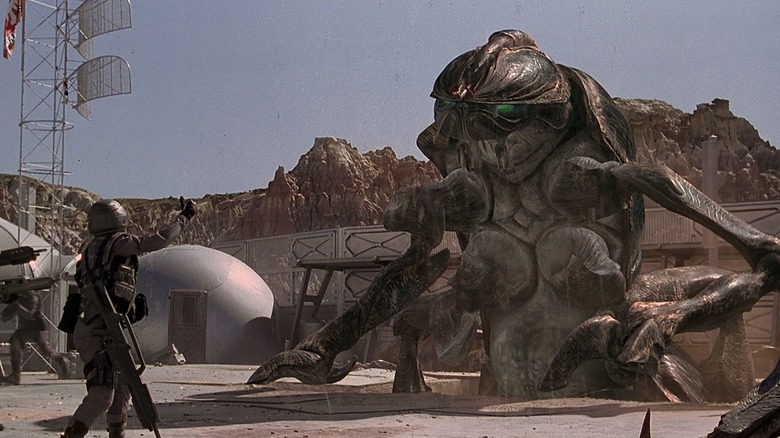
There is an old sketch from British comedians Mitchell and Webb; if you didn't see the show, you've probably seen the meme. As they await the approach of Russian troops, an SS officer consults his colleague regarding the skull-and-crossbones insignia on their caps. Hesitantly he asks, "Are we the baddies?"
It's a question that never crosses the minds of the protagonists in "Starship Troopers," Paul Verhoeven's violent satire of military excess and jingoism that drips with the same kind of fashion sense and iconography as the Third Reich. The director said he wanted to "make a film about fascists who aren't aware of their fascism" (via The Guardian) and to make his point he convinced Hollywood to give him $100 million to create a splattery sci-fi epic about teens fighting giant bugs on a distant planet.
It was a trashy premise that perhaps masked Verhoeven's satirical intentions at the time; the film was released slap-bang in the middle of Hollywood's golden era of big silly action movies. Who could really tell the Dutch director was taking the piss when you had Will Smith knocking out an evil alien with one punch in "Independence Day" or Nicolas Cage and John Travolta trading faces in "Face/Off?"
Sending up ridiculous action blockbusters along the way, Verhoeven gleefully used B-movie tropes to create a pastiche of corny old war propaganda films, balancing limp teen romance with lashings of gnarly gore rarely seen outside of a horror flick. It looks gloriously cheap and nasty and to attain this level of triple-A schlock, the director needed to take his premise very seriously.
So What Happens In Starship Troopers Again?
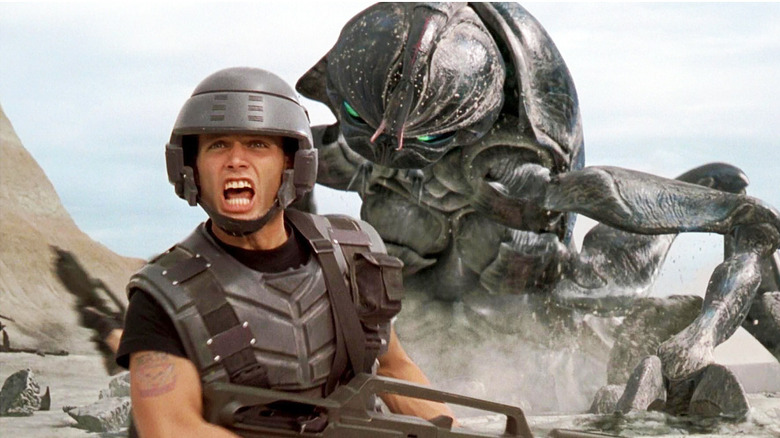
It is the 23rd century and Earth is now a spacefaring planet, governed by a military federation after democracy brought mankind to the brink of ruin. The population is divided into Civilians and Citizens and individuals can only gain citizenship through military service, earning the right to vote and have children. Glossy propaganda videos extol the virtues of bravely serving your planet and warn of the continual threat from bug asteroids, sent hurtling our way from the other side of the galaxy by the disgruntled inhabitants of Klendathu.
We meet a bunch of fresh-faced (and very white) high school students in Buenos Aires. There is Johnny Rico (Casper Van Dien), a football star, and his girlfriend Carmen Ibanez (Denise Richards); Dizzy Flores (Dina Meyer), Johnny's teammate who has a crush on him, and brainiac Carl Jenkins (Neil Patrick Harris), who has budding psychic powers.
After graduation, they all sign up for federal service. Johnny becomes a grunt in the Mobile Infantry, later joined by Dizzy; Carmen trains to become a pilot in the space fleet, and Carl's abilities make him the perfect fit for Military Intelligence.
Earth declares war on Klendathu when one of the asteroids wipes out the kids' hometown. Everyone is raring to kick some carapace but the first invasion is a disaster when Military Intelligence underestimates the Arachnids. This leads them to surmise there is a "Brain Bug" somewhere directing the seething hordes.
Paul Verhoeven presents this society as a utopia where everyone is middle-class and prosperous and all the kids are totally cool with the idea of military service, presumably brainwashed by the relentless propaganda. It is briefly mentioned that the bugs of Klendathu were minding their own business until humans started threatening their space, prompting the question: "Are we following the baddies here?"
Paul Verhoeven Took His B-Movie Premise Seriously
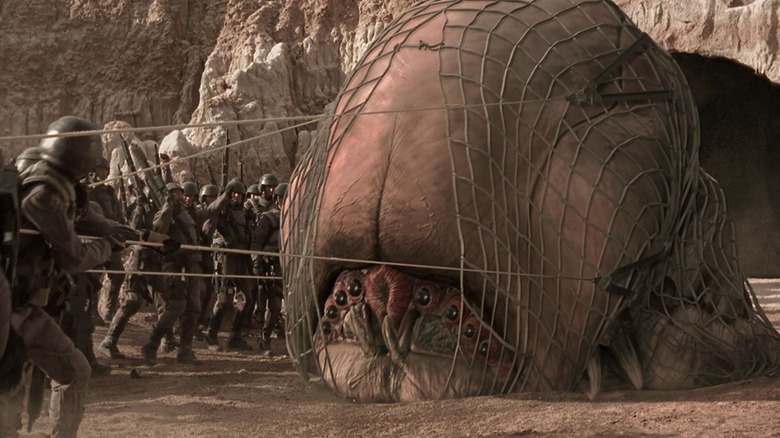
"Starship Troopers" began life as a treatment by "RoboCop" scribe Ed Neumeier (dubbed "Bug Hunt at Outpost 7"). "I wanted to do a big, silly, jingoistic, xenophobic, let's-go-out-and-kill-the-enemy movie, and I had settled on the idea that it should be against insects," Neumeier explained to the Los Angeles Times in 1996. "... I wanted to make a war movie, but I also wanted to make a teenage romance movie."
Neumeier and "RoboCop" producer John Davidson sought the rights to Robert Heinlein's right-wing novel "Starship Troopers," to which the screenwriter's concept bore a strong resemblance. The project piqued the interest of Paul Verhoeven as it reminded him of the old sci-fi stuff he liked when he was growing up. However, to make it fly for a '90s audience, he knew he needed to upgrade B-movie material to A-grade spectacle. To that end, Phill Tippett, creator of the ED-209 in "RoboCop" and Oscar-winner for his work on "Jurassic Park," came aboard to create the Arachnids.
Speaking to The Hollywood Interview in 2013, Verhoeven noted that the film "still approaches [its] reality in a very serious way, and I think it succeeds, and seems to be able to portray the world of another species that is extremely dangerous and realistic. You see these movies of the '40s and '50s like 'Them!' about giant ants, and so on, and they all seem today very [unrealistic]. But if you look at Ray Harryhausen's work, like 'Jason and the Argonauts,' it was much more sophisticated and poetic almost."
His approach paid off. The bugs in "Starship Troopers" still work incredibly well today and possess a weight that even a lot of modern CGI lacks, combining digital trickery and gloopy practical effects to put the menagerie of horrible creatures believably in the same environment as the actors.
Paul Verhoeven Took Propaganda Lessons From The Best
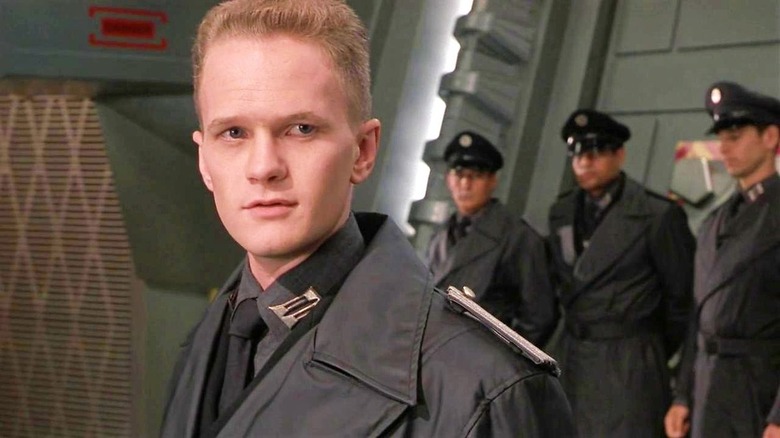
Paul Verhoeven is rarely shy about slipping political subtext into his movies and he saw "Starship Troopers" as an opportunity to critique American politics at a time when he felt the country could tip over into fascism (via The Guardian). To hammer home this point, he borrowed plenty of fascist imagery from the Third Reich and the work of Leni Riefenstahl, the German director notorious for her Nazi propaganda films like "Triumph of the Will."
From flags, slogans, and long shots of highly-regimented troops to the uniforms (Neil Patrick Harris's SS-style uniform is especially suggestive), Verhoeven lifted much of Riefenstahl's iconography right off the screen. Even Casper Van Dien, not the most talented of young '90s stars, was cast over the likes of Matt Damon and Mark Wahlberg because his chiseled good looks better suited the Aryan prototypes seen in Riefenstahl's films.
Verhoeven wasn't the first Hollywood director to utilize this startling imagery to convey the power and threat of a totalitarian regime. The ranks of Imperial Stormtroopers in the original "Star Wars" trilogy are a clear nod and "The Force Awakens" pushed that connection even further, cribbing shots directly from the Riefenstahl playbook. Even Disney got in on the action with "The Lion King," featuring low-angle shots of Scar on his pedestal overseeing legions of goose-stepping hyenas. The Dutch director wasn't the last, either. Peter Jackson's daunting shots of Sauron's troops also pay a debt of gratitude to Third Reich propaganda, as just one example.
Riefenstahl was never a member of the Nazi Party (via History Today), but she also couldn't escape the shadow of those films she made documenting the Third Reich. Over 80 years later, the potency of her work is still cinematic shorthand whenever a director wants to create a sense of overwhelming authoritarian force in their movies.
A Silly Movie That Asks Serious Questions
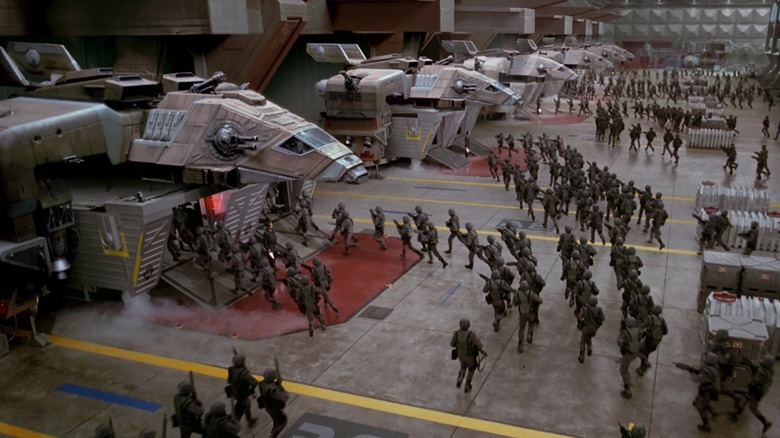
"Starship Troopers" is a far more sophisticated satire than it first appears. A lesser director might have chosen to portray the society we see in the film as a dystopia, or at least include a few details to suggest everything isn't quite as rosy as it seems on the surface. Paul Verhoeven doesn't hold the audience's hand in that way because that's not what he is trying to achieve.
Instead, his film asks the viewer to assess the imagery and interpret it for themselves. Is it fascistic? If so, how does it differ from what the Hollywood machine routinely feeds us? Should we cheer on cue as our hero mows down scores of faceless enemies in "Rambo: First Blood Part II," or are we able to take a step back and recognize that the excessive violence and gung-ho militarism borders on fascist fantasy? Can we then make another leap and recognize that those attitudes mirror real American foreign policy (something that perhaps became clearer to many people in the aftermath of 9/11 and the subsequent invasion of Iraq)?
It was a big ask for audiences at the time and I understand why some didn't get the point. As a Brit, however, who grew up with history lessons teaching us that we were the good guys, I fully appreciate the scope of Verhoeven's big-budget thought experiment. After all, there isn't much difference between "Starship Troopers" and "Zulu," the popular war movie that presented British soldiers as valiant heroes defending an outpost against overwhelming hordes of tribesmen but ignored the fact that we were the aggressors in the first place. Part of coming to terms with your country's imperial past is looking beyond the propaganda and accepting that, on many occasions, you were the baddies.
Read this next: The 95 Best Sci-Fi Movies Ever
The post Paul Verhoeven Took A Very Serious Approach To Starship Troopers' B-Movie Premise appeared first on /Film.
0 Commentaires